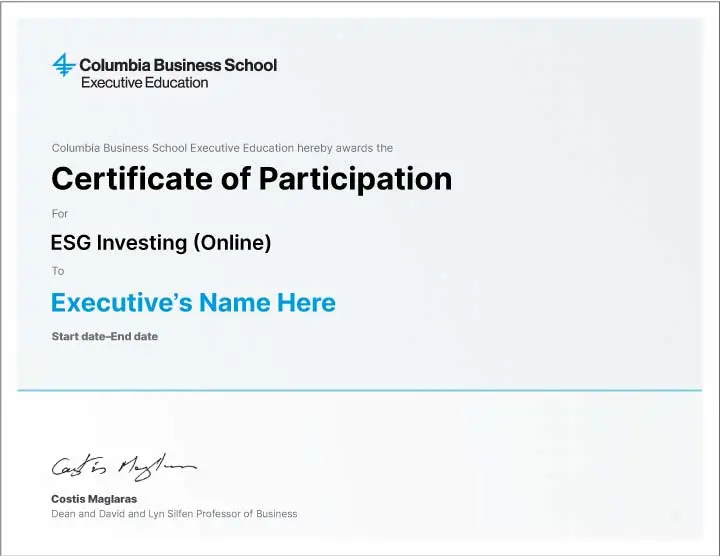ESG Investing (Online)
Early Registration Benefit
Apply now to secure your place at Invalid liquid data byInvalid liquid data.
Connect with a learning advisor for more information.
An Evidence-Based Approach to Sustainable Investing
What started as a corporate social responsibility initiative by the United Nations 20 years ago has swelled into the Environmental, Social, and Governance (ESG) movement. Many financial institutions and organizations have launched sustainability initiatives related to its governance, but there are critical questions to ask as we evaluate ESG investments, such as:
What are the key differences between public equity and public debt investing and between public and private markets?
What are the key regulatory efforts in ESG investing in the United States, Europe, and China?
How does a portfolio manager incorporate ESG factors into investment analysis?
How are investors thinking about climate change risk, and is there a useful framework that helps simplify this topic for capital allocators?
It is predicted that ESG assets could hit $53 trillion by 2025, a third of global assets under management.
Source: Bloomberg, 2021
Key Takeaways
The ESG Investing (Online) program will enable you to:
Examine the origins of the stakeholder movement, which forms the basis for ESG investing
Utilize ESG reporting frameworks appropriate for your industry
Analyze ESG ratings and supplementary data to ensure sound investment decisions
Explain how organizations are responding to climate risk
Use ESG data to inform stock picks and portfolio allocation decisions
Describe the future of ESG investing and how it will evolve
Who Should Attend?
While there are no specific prerequisites in terms of content knowledge, this program is designed for those who have experience in corporate finance, investment management, or banking.
Senior executives who seek to understand the current sustainable investing landscape and incorporate sustainability factors into their organizations' financial and investment decisions
Mid-Career managers and analysts who serve in finance or investment functions and play a key role in their organizations' financial matters
Program Modules
This program covers finance and sustainability as integrated subjects, beginning with an introduction to financial and investment principles and ending with financial analysis, financing, and valuation.
Program Experience

World-Renowned Faculty
Learn from accomplished faculty whose diverse backgrounds encompass a broad range of disciplines

Guest Speaker
Accomplished academics and experts offer unique perspectives and the opportunity to put learning into practice

Peer Interaction
Stimulating discussions with like-minded global peers expand your professional network and build a supportive community

Case Studies
Through exploratory sessions, examine practical examples and find innovative solutions to strategic challenges

Live Faculty Sessions
Get actionable insights in live online interactions with faculty who are recognized leaders in their fields

Engaging Assignments and Activities
Hone business acumen and executive skills with try-it activities that help you redefine your potential
Program Faculty

The Kester and Byrnes Professor of Accounting and Auditing at Columbia Business School
Guest Speaker

Managing Director and Global Head of Environmental, Social, and Governance (ESG) and Sustainability Research at Jefferies Group LLC

Certificate
Upon completion of the ESG Investing (Online) program, you will receive a certificate of participation from Columbia Business School Executive Education. This certificate also awards two credits towards the Certificate in Business Excellence, which grants select alumni and tuition benefits. Learn More
Your digitally verified certificate will be issued in your legal name and emailed to you, at no additional cost, upon completion of the program, including all modules of the program (online, in person, or live online, inter-module). All certificate images are for illustrative purposes only and may be subject to change at the discretion of Columbia Business School Executive Education.
FAQs
Didn't find what you were looking for? Write to us at learner.success@emeritus.org or Schedule a call with one of our Program Advisors or call us at +1 315 387 4431 (US) / +44 203 838 0836 (UK) / +65 3138 4449 (SG)
Early registrations are encouraged. Seats fill up quickly!
Flexible payment options available.
Starts On




